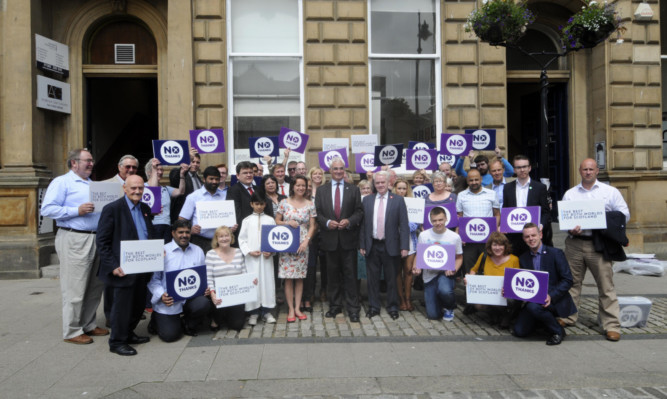Dundee is a “key battleground” in September’s independence referendum, according to the leader of Better Together.
Alistair Darling also predicted a No vote can “win well” by the banks of the Tay, despite Alex Salmond declaring it Scotland’s “Yes city” and a majority of people surveyed for The Courier backing a split from the rest of the UK.
As he opened his campaign group’s new office in the city centre, which will also serve campaigners in Angus, the former Labour Chancellor said he felt the tide was swinging towards his side.
He told The Courier: “Dundee is one of the major battlegrounds but we are confident that we will win here and we can win well.
“What’s increasingly obvious is that people are beginning to make their minds up because the polling day is now beginning to become a reality, people can see it is only two months to go.
“If you look at the last polls, they are showing people are moving our way, we have momentum but our job is to capitalise on that.
“We are not complacent, there is an awful lot to play for, two months is a long, long time. We can make our arguments because we think it is in the best interests of people living here to remain part of the UK.
“That’s where the jobs are going to come from, that’s where the security is going to come from, and in a deeply uncertain world you want to reduce all the risks that you are exposed to and you want to maximise the opportunities.”
The last poll said 46% of people who were certain to vote backed No, 37% Yes and 18% “don’t know”, the first time in several months the No lead has fallen below double-digits to 9% in a TNS survey.
Around 50 campaigners squeezed themselves into the small space being rented by Better Together on Panmure Street for Mr Darling’s address.
The office will serve as a drop-off and collection point for campaign materials, as well as being fully staffed and used as a phone canvassing hub.
Mr Darling said one of the key arguments he would be putting forward on the doorsteps would be about jobs.
He conceded that Dundee has “seen more than its fair share of companies going” over the past 30 years, but argued many of the big developments and employers locally were heavily linked to being part of the UK.
